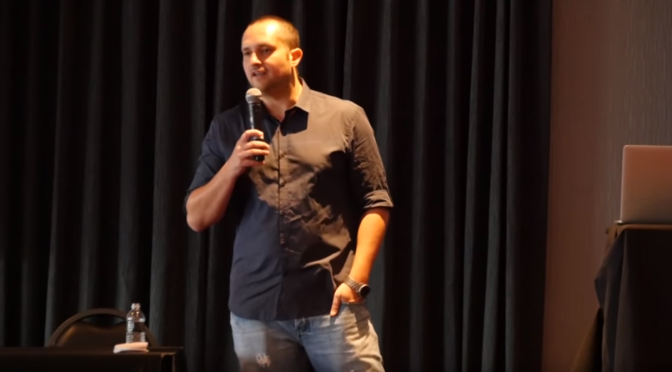By Kyle Torpey Nov 19, 2015 1:30 PM EST
Smart contract is a term that gets thrown around quite often in the Bitcoin community, but the reality is not many people truly understand why these types of cryptographic contracts are useful and secure. Smart contracts can come with varying levels of complexity, and one of the most widely-used smart contracts right now is a basic Bitcoin transaction. At the recent Bitcoin Investor Conference in Las Vegas, Stash Co-Founder Chris Odomexplained the key attribute of a smart contract that makes it different from a legal contract.
Smart Contracts Don’t Need a Court of Law
During his remarks on smart contracts, Chris Odom made it clear that the self-executing properties of these sorts of contracts are what separate them from the legal contracts that have been used in the past. He explained:
“The distinguishing factor of a smart contract is that it’s self executing. It executes on its own. You see, most contracts that people make in the legal world are contracts that are designed so that someday they have to be enforced in the court of law; they have to be legally enforced, and so they’re written that way. They’re written based on, you know, ‘We’re going to expect that if we have to enforce this it will be in a court of law, and therefore, all these terms are written based on that assumption.”
Odom also noted that the point of a smart contract is to — at least partially — avoid the legal system in its entirety. He explained that the preferred smart contracts are the ones that automate the enforcement of the contract and do not require the use of a court:
“The last thing you want on a [smart] contract is something saying that it’s enforceable in court. That, ‘Hey, if you use this smart contract, you’re going to end up in court!’ Who wants to sign that? That’s your worst nightmare. When I’m picking a smart contract, I want something that will securely flow the money properly according to its terms and will not land me in court.”
Smart Contracts Automate the Flow of Money
Another key point made by Odom during his presentation is that smart contracts are mostly about automating the flow of money between the parties associated with a particular contract. Instead of having a judge decide the outcome of a contract, a smart contract can automatically trigger a transfer of funds based on a set of parameters defined by computer code. Odom noted:
“A real smart contract is something that automates money flows. It does escrow; it does surety bonds; it does insurance. These are the sorts of things that we’re building with our smart contracts. They automate the money flow. The money goes in here; after so many days, it automatically goes over there, unless a dispute gets triggered, and then maybe an oracle has to come online — or a dispute mediator or arbitrator.”
Smart Contracts Operate Under Cryptographic Law
During his presentation, Chris Odom also told a short story about a lawyer who was recently trying to understand smart contracts and how they work. Odom told the lawyer there is one important statement that should be included in any smart contract:
“Here’s what you want to put in a smart contract. Here’s how you know when you’re writing a smart contract instead of a normal, legal contract. The first thing you put at the top of the contract is ‘This contract will not be enforceable in a court of law.’”
Odom claims the lawyer did not seem to understand the point of a contract that could not be enforced in a court of law, so he went on to describe his point in further detail:
“First of all, courts of law are not able to enforce these [contracts] anyway. Imagine that you’re in court, and there’s a judge, and she says, ‘I have ruled those bitcoins shall be moved to that address.’ But it doesn’t happen. Even though she has robes, a nice chair, and a bailiff with muscles, the bitcoins don’t move. You have to have the private key to move the bitcoins because bitcoins are not under legal law, they’re under cryptographic law. It’s a new form of law that’s coming into existence.”
In short, smart contracts do not require a court or a judge to be enforced. Not only do these types of contracts not operate within the current legal system, but as Odom explained, it is sometimes impossible to enforce the rule of law on what is essentially nothing more than computer code.
Kyle Torpey is a freelance journalist who has been following Bitcoin since 2011. His work has been featured on VICE Motherboard, Business Insider, RT’s Keiser Report, and many other media outlets. You can follow@kyletorpey on Twitter.
Full Article – http://insidebitcoins.com/news/chris-odom-bitcoins-are-not-under-legal-law-theyre-under-cryptographic-law/35915





